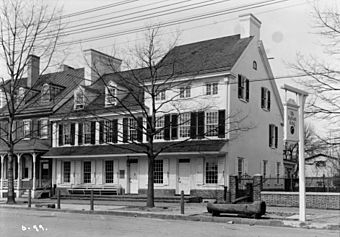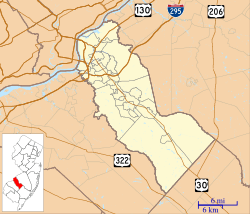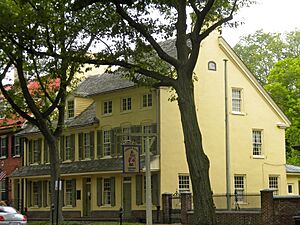Indian King Tavern facts for kids
Quick facts for kids |
|
|
Indian King Tavern
|
|
 |
|
| Location | Haddonfield, New Jersey |
|---|---|
| Built | 1750 |
| NRHP reference No. | 70000382 |
| Added to NRHP | December 18, 1970 |
The Indian King Tavern is a very old building in Haddonfield, New Jersey. It was once a busy place where people met and stayed. In 1777, something very important happened here: the New Jersey Legislature met and created the state's official symbol, the Great Seal.
This tavern was the first place in New Jersey to be named a State Historic Site. That happened way back in 1903. The building still looks much like it did hundreds of years ago. It is also listed on the National Register of Historic Places, which means it's a special historical landmark.
Contents
History of the Tavern
In 1745, a Quaker merchant named Mathias Aspden bought some land in the middle of Haddonfield. He cleared away old buildings and started building a large tavern. It was finished in 1750. However, some parts of the building are even older, dating back to 1730!
A Place for Important Talks
Taverns like the Indian King were very important places. People gathered there to buy and sell things, meet friends, and talk about what was happening. As the American Revolution began, these taverns became places for big debates. People argued about whether to support the British Empire or fight for independence.
The owner of the tavern, Mathias Aspden, Jr., had studied in England and supported the British. As tensions grew, he sold the tavern to Thomas Redman. Redman owned the local pharmacy. Aspden, Jr. then moved to England for good in 1776. His properties in New Jersey and Pennsylvania were later taken by the new American government.
The Revolution Comes to Haddonfield
During the American Revolution, armies marched through New Jersey. Towns like Princeton and Trenton were greatly affected. People in Haddonfield often met at the Indian King Tavern. Thomas Redman, the tavern owner, was also a clerk for the local Quaker meeting. Quakers believe in peace and do not fight in wars. Redman had to read documents that shared these peaceful ideas.
Because of this, in January 1777, Redman was arrested by an officer from the American army. He was put in jail for a short time in Woodbury. When he returned to his tavern in March 1777, he found that the state had used his tavern to create a "Council of Safety." This group's job was to deal with people who left the army or supported the British. It's thought that the tavern's cellar was used to hold extra people when the guard house across the street was full.
Less than two months later, Redman sold the tavern to Hugh Creighton. Creighton already owned another tavern nearby. His old tavern was called the "Indian King" because its first owner, Sarah Norris, wanted to honor the Lenape Native Americans. They had helped the first European settlers. When Hugh Creighton bought the new tavern on Kings Highway, he moved the "Indian King" name to it.
Generals and Legends
The Indian King Tavern was used by soldiers from both sides during the war. British, Hessian (German soldiers fighting for the British), and American troops all stayed there. Famous American generals like Anthony Wayne and the Marquis de Lafayette marched along Kings Highway. The Polish Count Casimir Pulaski also passed through. Since the Indian King Tavern was the biggest and most important, these leaders likely used it for meetings, lodging, and rest. Today, some British and Hessian soldiers who died in Haddonfield are buried in unmarked graves nearby.
Some fun stories about the Indian King Tavern have been told over the years, but they aren't true. For example, people used to say that Dolley Madison, a future First Lady, often came to dances there. Another story was that tunnels from the tavern under Kings Highway were part of the Underground Railroad, a secret network that helped enslaved people escape to freedom. These stories have been found to be just legends.
New Jersey's First Laws
On July 2, 1776, New Jersey declared itself a free and independent state. In 1777, the New Jersey Legislature needed a safe place to meet because of all the fighting. They chose the large meeting room on the second floor of the Indian King Tavern. There, they officially read the Declaration of Independence, which had been created in Philadelphia the year before. They also passed a law that formally accepted its terms. The Legislature stayed at the tavern for some time, managing the new state's business.
The Tavern Today
In 1903, the state of New Jersey bought the Indian King Tavern because of its important history. They removed newer parts of the building and made it look like its original two-and-a-half stories. The Indian King Tavern Museum was the very first New Jersey Historic Site.
Today, the museum is managed by the New Jersey Division of Parks and Forestry. You can take free tours of the first and second floors. The cellar, however, is not open to tours. Its unusual layout and secret passages are still a bit of a mystery! While the main parts of the building are original, some of the items inside are copies made to look like the old ones.
See Also
| History of New Jersey |
|
|---|---|
 |
|
| Colonial period | |
| American Revolution | |
| Nineteenth century | |
| Twentieth century | |
| Twenty-first century | |
| Timeline of New Jersey | |
 | Tommie Smith |
 | Simone Manuel |
 | Shani Davis |
 | Simone Biles |
 | Alice Coachman |





